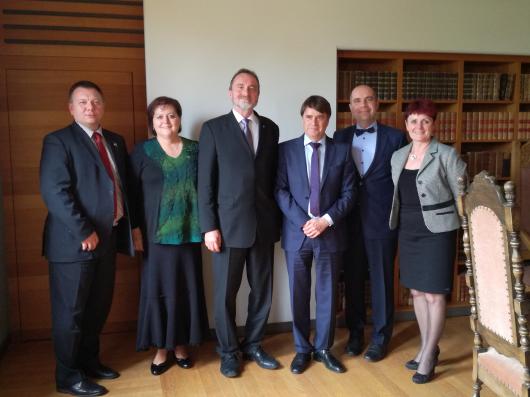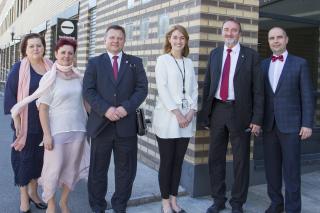
Visit of a delegation from the Constitutional Committee of the Senate of the Parliament of the Czech Republic in Iceland and Norway
06.06.2017 / 16:06 | Aktualizováno: 07.06.2017 / 00:20
(This article expired 10.10.2017 / 16:18.)
From 27 May to 2 June 2017, a working visit to the Republic of Iceland and the Kingdom of Norway was carried out by a delegation from the Constitutional and Legal Committee of the Senate of the Parliament of the Czech Republic, composed by Sen. Dr. Miroslav Antl (Chairman of the Committee), Sen. Dr. Radek Sušil (Vice-Chairperson), Sen. Emílie Třísková (Vice-Chairperson) and Sen. Anna Hubáčková (Member).
On the Committee's agenda, meetings were held in both countries with senior justice officials, partner committees, as well as there was a visit to a correctional and educational facility.
The introduction of the Icelandic part of the working visit provided a meeting with the Honorary Consul of the Czech Republic in Iceland Mr. Ö. Skarphéðinsson, who presented the work of the Honorary Consulate to the members of the delegation and informed them about the current political situation in Iceland. Within the framework of the talkings, the two sides devoted themselves to the possibilities of increasing the presence of Czech business companies on the Icelandic market.
Subsequently, the Delegation from the Senate examined the newly opened modern Hólmsheiði Prison, which was built in 2015. Accompanied by the director of the prison Mr. G. Gíslason, the Senators were given the opportunity to learn about the conditions under which the prison sentence is served.
The next item was a visit of the Supreme Court of the Republic of Iceland. The delegation was welcomed by the SC´s President Þorgeir Örlygsson. He informed that in the judicial system of the Republic of Iceland, the existing two-instance court model will be changed to a three-state court from 1. January 2018. Up to now, the Icelandic courts operate in the two-element scheme of "General Courts - the Supreme Court," but from the above-mentioned date between the two instances, the so-called Middle Court, which will be primarily a court of appeals, will exist. Regarding the SC's own decision-making activity, then it consists of 75% civil litigations and of 25% criminal-law dispute agenda.
Finally, the delegation was adopted by a partner body, the Alþingi Constitutional and Control Committee. Representatives of the Constitutional and Control Committee have extensively informed the Czech partners about the proposal for a new constitution of the Republic of Iceland, which, compared to the existing constitutional instrument, will accentuate the greater share of direct democracy, for example, through the institute of the referendum, if 10% of Icelandic voters so request.
The final stop in Iceland was a discussion at the Ministry of Justice. The delegation was met by Ms Sigríður Á. Andersen, Director General for Justice Affairs. The subject of the interview was, as in the case of a visit to the Supreme Court, the issue of changes in the Icelandic justice system and the role of the prosecution throughout the criminal proceedings.
The first meeting of the Senate delegation in Norway took place in the Standing Committee on Control and Constitutional Affairs of the Storting. His Vice-Chairman, Dr. Michael Tetzschner, presented the work of the committee, which consists primarily of initiating amendments to the Constitution, reporting regularly on audit findings, and hearing complaints from the so-called parliamentary ombudsman. The representatives of the Standing Committee on Control and Constitutional Affairs also provided an account of the historical stage of Norwegian constitutional development dating back to 1814-2009, known as the Storting's „false bikameralism“, which, after the Storting elections, was quasi-divided into Lagting and Odelsting.
As part of the admission to the Ministry of Justice and Public Security under the auspices of State Secretary Ms. Torill Ch. Ulleberg Reynolds, the police reform in Norway and its role in criminal proceedings were discussed. The prosecutor's position in criminal proceedings and the role of investigating magistrates was also discussed.
At the beginning of the meeting at the Supreme Court of Norway, the ambassador presented the candidacy of the Constitutional Court of the Czech Republic for the presidency of the Congress of the Conference of European Constitutional Courts to be decided at the summit in Batumi, Georgia. Constitutional Judge Mr. A. Bårdsen explained to the members of the Senate delegation the process of nomination of the Supreme Court´s judges, as well as the prerequisites for the execution of a judge of the first instance.
The last point of the Committee program in Norway was a visit to the University College of Norwegian Correctional Service (KRUS) and the Directorate of the Norwegian Prison Administration. Director of the prison administration, Mr. K. Ekhaugen, informed the delegation about joint Norwegian-Czech projects within the prison system. These are implemented using the so-called Norwegian funds. As a successful project, the Jiřice prison facility, which is to serve as a pilot project of the so-called open prison, was mentioned.









